The man who became Britain's biggest crystal meth dealer
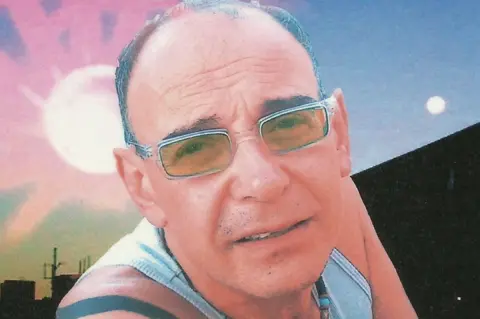 Family photo
Family photoRichard Lubbock was a middle-class coin dealer when, in 2003, he separated from his wife and swapped his quiet life for clubbing and drugs. He ended up being imprisoned for possessing crystal meth worth more than £1.5m.
When 30 police officers stormed Richard Lubbock's luxury apartment in 2009, as he sat half-dressed watching a documentary series about World War Two, one thought crossed his mind: "Thank God it's over."
The coin dealer, aged 62 at the time, had by then become what was said to be Britain's biggest dealer of crystal meth.
His involvement had grown over several years - the catalyst being the separation from his wife after coming out as gay.
He began going to nightclubs, looking to meet new people. But he was not successful.
"At the age of 55, going clubbing was fine but I couldn't talk with anyone," he tells BBC Two's Victoria Derbyshire programme.
"People would dance next to me but I felt really awkward."
The solution, he told himself at the time, was to start selling drugs. It had an effect.
"People would come up to me for a reason, to start chatting," he says.
 Family photo
Family photoOver subsequent years, however, following this path was to drag the businessman from his middle-class lifestyle into addiction and an entirely new, criminal lifestyle.
Lubbock, originally from Elstree, Hertfordshire, bought two penthouse apartments in Limehouse, east London, and started dealing.
This included crystal meth, a highly addictive class-A drug.
The repercussions of his dealing on others, he says, "wasn't on my mind" - but there are serious associated health risks, including of heart attack. Overdose can lead to death.
There is also evidence suggesting long-term use can cause brain damage and severe psychosis.
Asked about this, Lubbock says he regrets his actions and "obviously knew it was wrong... but I didn't want to stop as I was enjoying myself".
"It's true, I think, I wanted to be caught."
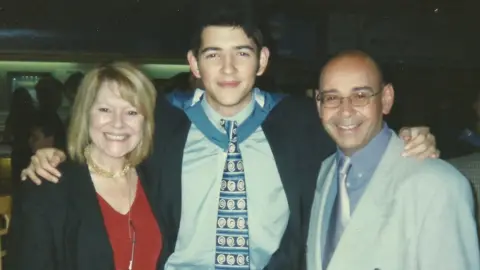 Family photo
Family photoHis son James - who had finished university and was working in social media marketing - remembers his father was "changing", his health "deteriorating".
But, he says, any attempts to challenge his behaviour were dismissed.
"I'm small fry, the police don't care about me," would be his father's response, James says.
Asked if he considered calling the authorities himself, James says he "thought about it" but hoped that his father would "see reason and go back to being a normal dad".
"I was convinced if he went to prison he would be bullied and wouldn't survive a day."
During this time, James's mother Marilyn died of cancer.
But his father's habits, and growing drugs operation, continued.
Richard was not there to support his ex-wife, James says, nor there for him when he was struggling to cope with his mother's death.
Drugs in freezer
Instead, during Richard's addiction, he introduced James to crystal meth, for which, he says, he can never forgive himself.
At that point, by his own admission, he was in a "state".
And then, one day, police burst through the door.
Richard says he kept calm and still - probably an effect of the drug.
Crystal meth with a street value of £1.5m was found, some of it stashed in the freezer alongside his favourite brand of ice cream.
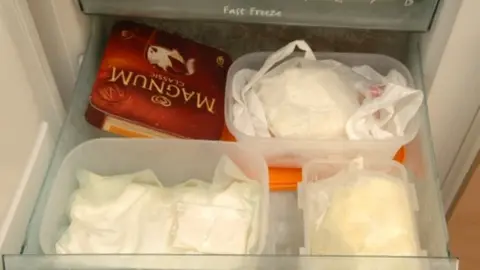 Met police
Met policeThe story hit the headlines.
James - who has written a book about his father's story - was at work when he got a phone call from his friend.
He saw the local news report first, and hoped the coverage would die down - but then it became national news.
"I was distraught," he says, "they said he had been caught red-handed, and would go to jail for a long time."
Life 'back on track'
His father was given an eight-year sentence, serving four.
Richard, far from being aggrieved, was grateful.
He says it enabled him to get his life back on track.
"It went by the fastest four years of my life. I was doing things I was enjoying," he says.
"I became an assistant teacher [in the prison] for English and maths," he says, adding that he was put in charge of his wing's football team.
"These guys were desperate for advice from someone like a father figure. By doing that, it gave them all a meaning and helped me personally.
"I got a sense of achievement I had never felt before."
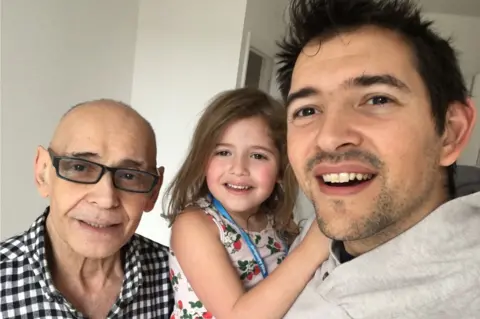 Family photo
Family photoJames describes his father's prison time as a "rebirth".
"He was completely broken when he went in.
"But they helped him out, and took pity on him as someone who hadn't really lived a criminal life.
"He was able to live a structured life which helped his mental state. It gave him a confidence that he could be OK," he says.
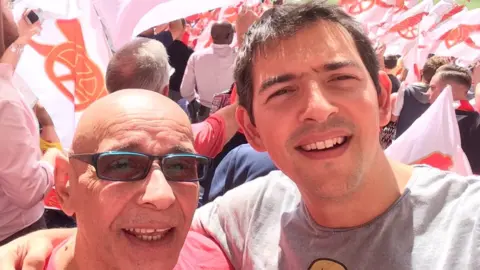 Family photo
Family photoRichard was released in 2013.
Now 72, he is living in a housing association flat and "seeing the family as much as I can".
"The time since I got out has gone by even faster than before."
He is unequivocal that he will never return to drugs.
Instead, it is his family that now means the most to him.
"My granddaughters are so important to me," he says.
"I feel young again when I am with them."
For information and support on addiction, visit the BBC's Action Line.

